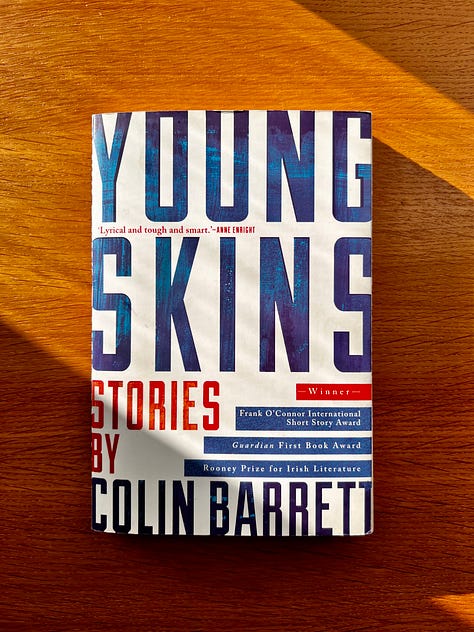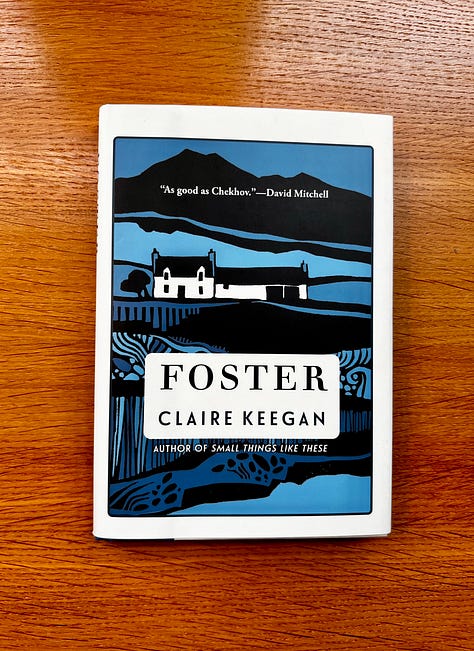


Last week I read Bob Dylan’s Chronicles with my Rock ‘n’ Roll Book Club™ and found the voice utterly addicting and so, I thought to myself, why not write this week’s book(ish) in the voice of Bob Dylan? Hold on tight, it’s gonna get weird.
+++
Young Skins: just another name for goons, wisecrackers, dropouts, and druggies, and that’s exactly what the people are in these stories. They’re wrecked and forgotten and foreboding. They’ve got a mean streak and could cook a steak just by looking at it. I read about these characters like Arm, who’s got this crazed manic violent energy as he struts around Glanbeigh, a small Irish working-class town with his buddy, Dympna, the town’s marijuana dealer, proudly or maybe not so proudly fulfilling his duty as Dympna’s muscle, and I thought about how codependence runs deep even in the rough and rowdy and proudly individualistic. The opening scene of the story is like being thrown into Lake Superior in January half asleep. One minute you’re dreaming and the next you’re shaking like a dog, blue in the face, confused, weathered and withering under the great and powerful energy of it all. There’s a lot of stabbing jabbing poetry in here, like this: “The low sky was slabbed with rifts of cloud the colour and texture of raw animal fat.” The lines jerk you around, shake you awake, make sure you’re paying attention. Things happen fast in Colin Barrett’s world, maybe sometimes too fast, a tad “look at me” but all in all there’s a darkness and tenderness and a whiplashing humor here that’s pretty unforgettable. The best of the lot is probably the “The Clancy Kid,” about Jimmy and Tug, who go wandering around looking for Marlene, Jimmy’s girl who got away, which isn’t much when you look at it except when you really look it if you get what the getting is. I remember liking this book more eight years ago when I was maybe closer in age to a lot of these wisecracking twenty-something tough guys and wannabe tough guys but, hey, that’s life. Still plenty of jagged edges here. You might want to wear some shin guards before you start reading.
That Old Country Music is true in the truest sense. Kevin Barry’s voice haunts and comforts and tickles the innermost ear and gets down deep in your nerves. One story, “Ox Mountain Death Song,” might be a Coen Brothers feature film, and what Barry does in sixteen pages is something of a miracle. The story draws a tight focus on a wild goose chase up a steep mountainside featuring Sergeant Brown, a sixty-five year-old wheezing cowboy type who loves cinnamon rolls and has a serious aching bone to pick about a notorious criminal, Canavan, a man who’s been “planting babies all over the Ox Mountains since he was seventeen years old.” The mountains of County Sligo come alive in casual swipes, “elk, wolves, bear” and “bracken stretches” and “a place with a diabolic feeling sometimes along its shale and bracken stretches; a darkness that seeped not from above but from beneath.” A voice in my head said, “So this is how the soul of a writer sounds.” And even when the stories here feel like vignettes, insignificant noodling, they pull you in by mysterious forces, like some stranger grabbing you by the collar in a dark alley and whisper-growling a story into your ear, his scratchy beard on your neck, only to flee and never be seen again. “Toronto and the State of Grace” walloped me sideways. It ain’t much—a sober bartender at a seaside bar gets a few visitors. But the squalls and washed-up jellyfish and the “lifeless and dreary winter day” cook you till your crispy. And when Barry says “a frail bird-faced old dear in furs” I know exactly who he’s talking about. There’s no guessing. I like a long full breath, and have been given to lengthy stories myself, so sometimes I had to do a double-take and reread a passage, but I was better for it. Go get some Kevin Barry. I hear this one’s good, too.
Foster is yet another miracle from the inimitable Claire Keegan. Reminds me of those songs you hear for the first time and feel like you’ve been hearing them all your life, that they were made to exist and might exist on some other plain or planet. Keegan drills down so deep inside the child narrator that you immediately feel the careening and rattling inside the child’s mind as her gambling, smoking father drives her out to a seaside village to stay with the Kinsellas, who are presumably her mother’s “people,” though what people we never really know. The child comes from a poor family whose house is crazed and boisterous with other children and too many chores to handle, so she’s shipped off for the summer, and no one tells her if or when she’ll return. Her mother is pregnant, and her father can’t pull himself up enough to cut the hay on his farm. Time is a mystery in the universe of a child, and it’s probably a mystery to all of us if we accepted its mysteriousness, and the child in this story knows that well and good, and so how much time passes here? We hear about hunger strikes and labor disputes and the Kinsellas go to Mass twice, so there’s at least a couple weeks in the passing of time, but it might as well be an eternity, because this girl is learning to love, and learning about loss, and learning that just because a man gets angry doesn’t mean he’ll hit her, and learning all kinds of things that’ll never leave her alone. I don’t cry too much these days but this one had me blubbering like a baby, and I read it in one sitting with a glass of Heaven’s Door in my hand and by golly it knocked me sober and might’ve made me even say a prayer.
+++
Thanks for sticking around. Now tell me: what are you reading? And if you’d like to be involved in the year-end round up and tell the readers of book(ish) about your reading life this year, I’d love to hear from you. Email me: cook.joshuap@gmail.com. Remember to support your local independent booksellers if you can, or shop online at Bookshop. Take care.



